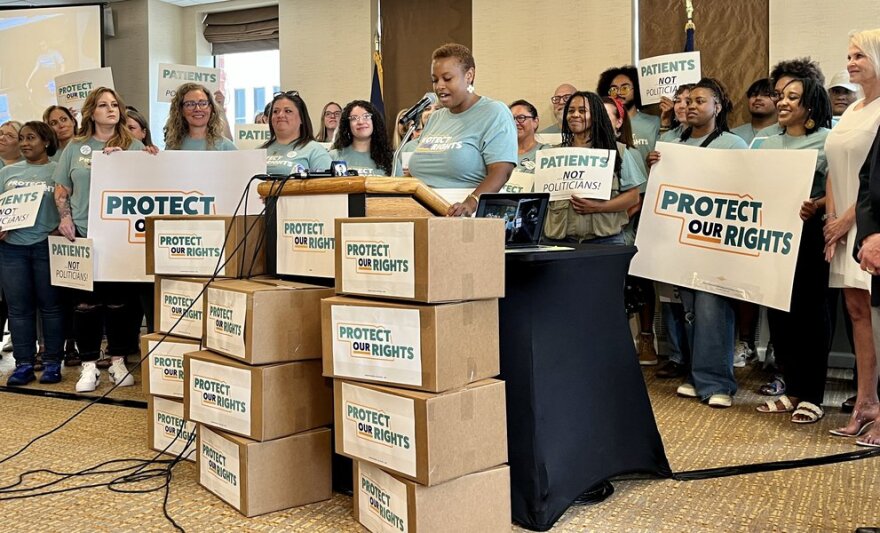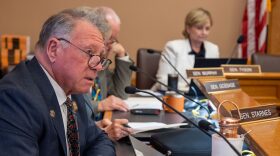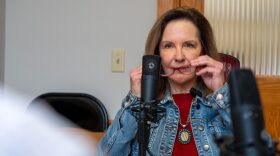New polling suggests Nebraskans support both measures on abortion as well as reject a plan to allow taxpayer funds to go to private schools.
The Midwest Newsroom partnered with Emerson College Polling to conduct surveys of registered voters in Iowa, Kansas, Missouri and Nebraska between Sept. 26 and Oct. 2. The sample size was 1,000 persons in each state, with a margin of error of plus or minus 3% and a 95% confidence level.
The four polls included questions specific about issues on Nov. 5 ballots in each state in addition to topics and themes that are not on ballots, but have become prominent features of public discourse.
Dale Johnson sat down with Holly Edgell, the managing editor of the Midwest Newsroom, and Daniel Wheaton, Midwest Newsroom data journalist, about the findings. This conversation has been lightly edited for clarity.
Dale Johnson: Holly, why take this on?
Holly Edgell: Well, Dale, we really wanted to provide people in our four states, which often get overlooked in national discourse, with a look at what their their neighbors and friends are actually thinking about a number of issues. So not just what's on the ballot in November, which we do include some of those, but also there's a just a wide range of issues that keep coming up in sort of public debate and discourse. And we wanted to get a sense of, you know, the nuance that's there that often gets overlooked in sort of national polls and national conversation about, quote, unquote, what Midwesterners think.
Johnson: We will break this down and have Nebraska statistics in this conversation, but this poll taking in four states shows that most respondents oppose book bans, support abortion access, believe lawmakers are not working in the best interest of their state, and that a four year college degree is not worth the cost. I turn to Daniel. Daniel, you have forgotten more about data than I know you talk the language. So what impresses you about this poll?
Daniel Wheaton: So first, it's important to understand the basic methodology. This is essentially four small polls together, all have a sample of 1,000 registered voters in each state. So Emerson College polling called up 1,000 registered voters in Nebraska and asked them all of these questions, ranging from demographic and political information to the specific questions about politics and kind of in general, the response is that people are kind of pessimistic. People don't believe that government is working for them. There's some frustration. They're saying the U.S. is not going in the right direction, and I think a part of that is just the politics and the news of the past four years. You got two wars going on, you have inflation slowly receding. Things are somewhat complicated, and you're seeing that kind of frustration come through in the poll results. But it is important for us to focus on our region, because on a national sample of 1,000 voters, maybe four, ten are from Nebraska. Here you have 1,000 Nebraskans surveyed, and that doesn't happen very often.
Johnson: It's not unusual for states to disagree with each other, but is there an outlier among the four? Maybe we'll have to break this down subject by subject. But as you look at it, Nebraska, Iowa, Kansas, Missouri, one more conservative, one more liberal. Any outlier among the four?
Wheaton: No, it's pretty consistent, and part of why you're seeing that negativity is largely because there are more Republicans than Democrats in these four states, and because Joe Biden is currently president. Do you see that connection as to why things are not going on "the right direction," but in general, all four states are moving in the same direction. When it comes to they say they're conservative, but when it comes to specific things like book bans or abortion access, there is a majority of people who are supportive of them. But when you look at the cross tabs, you do see some nuances. In general, I'm noticing the biggest changes between educational attainment and age. So in general, people who don't have college educations are more likely to be unsure or more conservative on things, while it's the opposite for those that have Master's degrees and PhDs. And also, in general, you see more confusion with younger voters, maybe people who haven't voted yet at all, compared to people who are in their 70s who have voted multiple times.
Johnson: What I found interesting is that voters are entirely different, in some cases, than their legislative bodies. The lawmakers will side one way, and voters completely disagree with what's going on among their lawmakers.
Wheaton: Also, when you simplify it down to you know, are they doing what you want? Of course, more people are going to say no, because everyone has their own niche thing they can niche thing they care about, and unless you happen to be perfectly aligned with your own state legislature, it's unlikely you're thinking that things are perfect.
Johnson: Let's focus on Nebraska. Holly, jump in here, where there are two abortion measures referring to Nebraska, two abortion measures on the ballot. Initiative 434 keeps the current 12 week ban in place. Initiative 439 expands abortion rights to fetal viability, or about 24 weeks. By the way. Voters the numbers that I'm giving Measure 434, and Measure 439 you will see those numbers on the ballot so you will be able to differentiate them.
Edgell: That's right. So it's fairly close, and I'll start with the "unsures." So about 14% on average, of the people who actually took this poll, are unsure where they stand. So that's a decent size of sample for people on either side of this issue to try to get their message to between now and Election Day. But in the yes column for both of these measures, which is really interesting, it is very, very close. So for the measure, that's where the language talks about providing for a state constitutional right to abortion before fetal viability. In favor, about 42% are saying yes. 64%, no, and 15.5% are unsure. The other measure, which is prohibiting abortion after the first trimester. With some exceptions, we have a 46% saying yes, in favor, 40% saying no, and about 13% who are unsure. So Dale, this measure, this constitutional amendment could be decided by hundreds or thousands of people in the low numbers. It's very close.
Johnson: And let's point out that the initiative measure that receives the most raw votes will be the one that passes.
Edgell: It will become part of the Nebraska constitution. So this is a very, you know, momentous time for the voters of Nebraska on this issue.
Wheaton: So looking at the cross tabs, you can almost consider this unsure column as persuadable voters. So I'm looking at the one that would have a constitutional right for fetal viability. The highest number, 24% is people who have just high school education or less, so people who did not go to college. That is your biggest chunk of persuadable voters, followed by that are people who are independents, and then people who are 29 or younger. And when I look at the other initiative, it's essentially the exact same trend in which people who didn't vote in 2020 are the most persuadable, followed by a tie between those people that are in their 20s and people who don't have college education. And it's interesting that you're seeing these trends consistently, because these aren't people who aren't politically engaged. They have registered to vote, they intend to vote, but they haven't decided each way yet. So it seems that these campaigns may need to target their message on these individuals to inform them of what's going on in the less than a month that we have left.
Johnson: On we go to medical cannabis initiative Measures 437, and 438, again, numbers that you will see on the ballot when you go to the polls, these focus on the use of medical cannabis in Nebraska. What do the polls find?
Edgell: We asked Nebraskans about medical marijuana, and the question was phrased on the ballot measure to legalize medical marijuana: Would you vote yes to legalize the medical use of marijuana, or no in opposition, and 59% said yes, 8% were unsure, and 33% said no. So that's a pretty big vote of confidence, I would say, along with the sort of set of people who could still be persuaded either way.
Wheaton: And also looking at the cross tabs, those that are opposed, the biggest chunks are Republicans and people who voted for Donald Trump, about 50% of those groups. And this, it's kind of the inverse as well, in which generally younger people and also people who voted for Joe Biden in 2020 are in more supportive medical marijuana. When it comes to the unsures, it's pretty low. Across the board, the highest number of unsure people are those who didn't vote and people who are independents, but both of those numbers are in the teens.
Johnson: Daniel, this would go back to my observation about voters differentiating from lawmakers in the legislature. Here in Nebraska, there's huge opposition to medical cannabis, but yet, you ask the person on the street they want it passed.
Wheaton: The fact that you know so many states that border Nebraska have it, it's essentially, you know, the reality of what's legal versus what is possible to obtain is different in Nebraska.

Johnson: Again, Holly and Daniel, this poll asked voters. This is another subject taxpayer money for private schools, asking voters if they support using state taxpayer dollars to help fund private schools. That shows up on the ballot as referendum measure 435, results?
Edgell: We did ask, do you support or oppose using state taxpayer funds to help fund private schools? And here we have, again, a pretty decisive answer of 60% saying they oppose it, about 29% support and 12% unsure. So to your point, and the theme that we have here is, you know, what are the legislators saying that they need to do on behalf of voters, and what are voters actually saying they want? So again, that's 60% said they oppose using state taxpayer funds to fund private schools.
Wheaton: Yep. And looking at the specific populations, more or less everyone's in line, in which you see that split of most people being opposed, across the board, across age, across education, it seems that in general, people don't want this measure to pass.
Johnson: What other questions, Holly, came up in your poll?
Holly: Well, we know that there's been a lot of public discussion about whether convicted felons should be able to vote in elections. This is not on the ballot, but we really wanted to ask it. And 34% of respondents in Nebraska said felons should be allowed to vote after they complete their sentence. 26% said they should be allowed to vote two years after they complete their sentence, and very close. 27% said, No, not at all. Felons should not be allowed to vote period, but again, 7% are unsure. So I think that this is also something that legislators will. Want to look at, perhaps in the coming legislative session or through some other mechanism. But again, this is the voters saying, Give these give felons who have done their time and served their sentence the opportunity to vote. And that is 34%.
Johnson: Another example of voters opposing the attorney general, for example, and the Secretary of State here in Nebraska, for example, both are working toward not allowing felons at all to vote.
Wheaton: Interestingly, the population that is strongest against allowing felons to vote are people who voted for Donald Trump, who, of course, is a convicted felon.
Johnson: And again, polling experts will say this is a snapshot in time. This poll was taken late September, early October.
Wheaton: September 26 to October 2.
Edgell: We really worked with our partners, including the news leaders there at Nebraska public media, to come up with these questions. We consulted our partners, and we really, we really want to thank them for the thought they put into this. That's how we came up with this list of questions. Because we thought that in Nebraska, folks want to weigh in on these issues, and we want to know what they think.
Johnson: And we, here at Nebraska Public Media, benefit from the efforts out of the Midwest newsroom. So Holly, thank you for that. And Daniel, thank you for that too.
The Midwest Newsroom is an investigative and enterprise journalism collaboration that includes Iowa Public Radio, KCUR, Nebraska Public Media, St. Louis Public Radio and NPR.
Copyright 2024 KCUR 89.3







